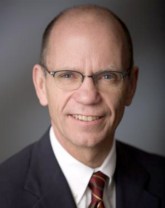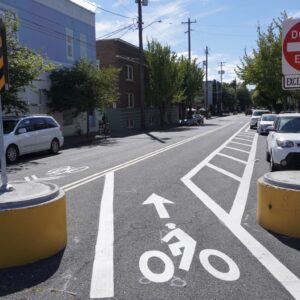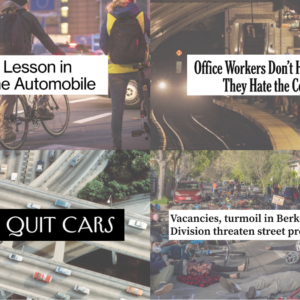
(Photo: Gerding Edlen)
Did anyone else see this interview with Gerding Edlen CEO Mark Edlen on BlueOregon last week? In it, Edlen talks about the future of Portland and he mentions biking and walking several times.
His comments show that planning for a future where cars play a much more minor role in our transportation mix isn’t only on the minds of activists.
Edlen lays out the reality that Portland is likely to see millions more people moving here in the not so distant future and in order to prepare for that we need to create new industries (cough, bicycles and bike parts, cough) and create streets where people can safely walk and bike.
Edlen also talks about “resiliency” as it pertains to a sustainable city (his firm specializes in green building) and shares this story:
“I think that deeply sustainable cities are the answer. You know, a good example here in Portland is the bike culture. I mean, I think that’s way cool. First of all, I think it’s on fire. I love to see that. And you know, we got a building that, you know, we screwed up our nerve and we cut back on parking dramatically and – you know what?- we can’t sell all the parking. And our biggest problem in the building? Bicycle tire marks going down the corridors. I think it’s a great thing.”
When the interview turned to the role of innovation, Edlen once again turned his thoughts towards transportation:
“… we would like to move to where LEED platinum is kind of our standard, and beyond. But, LEED is just about the building, and we always thought about community and we always thought about – you know, one thing I like to think about a sign of success is jaywalking. And meaning that if a pedestrian can feel like he or she can own the streets, own the sidewalk and own the street, you know, that’s a great thing. Because then the auto doesn’t…
We used to think that getting to a LEED platinum building was like the Holy Grail. But it’s not… Thinking about how to create a sense of community around a place, a neighborhood that people want to own – maybe not in a legal sense but in a psychological sense – and how they can live and work and play in a fashion that’s softer on the community and softer on the environment and healthier. Because, good lord, think about diabetes. If we could get people out to walk, you know, opposed to drive ten blocks. That’s a big deal.”
The final question for Edlen was how he sees Portland 10 years from now…
“I think ten years from now our transportation system is probably even more refined. I love the article in The Oregonian about a $16 million shortfall in the Bureau of Transportation’s budget and there was a quote that one of the biggest reasons is because more people are driving more fuel efficient cars, or they’re getting out of their cars. That’s a great problem to have. So I see fewer cars.”
I couldn’t agree more with Edlen about the PBOT budget. The historic level of cuts they face is an opportunity to finally restructure our approach to transportation funding and policies.
Many people assume that big-time corporate developers like Edlen are the enemy or that they’d cringe at any suggestion of a diminished role of automobiles in cities. Mark Edlen shatters that stereotype and hopefully City Hall is listening. Read the full interview on BlueOregon.







Thanks for reading.
BikePortland has served this community with independent community journalism since 2005. We rely on subscriptions from readers like you to survive. Your financial support is vital in keeping this valuable resource alive and well.
Please subscribe today to strengthen and expand our work.
Less space for cars means more space for people and nature in the city and less need to expand the urban growth boundary. But for every Mark Elden there remain plenty of individuals in the real estate and development industries who relentlessly push the Metro Council to expand the UGB as they did again last month:
http://www.oregonlive.com/environment/index.ssf/2011/10/metro_approves_urban_growth_bo.html
The recent expansion (there has been over 20,000 acres added since 2002) will spread ever limited infrastructure dollars over a larger land area and further sap resources available to invest in existing communities.
The solution is both stronger leadership on Metro Council and changes in state laws (signed by Kitzhaber in the 1990s) that require Metro to consider UGB expansions every 5 years.
Mark Elden isn’t interested in anything other than putting more coin in his pocket. Everything else is just a means to that end.
I don’t doubt that’s true, but I’d rather see his vision for future development prevail, as opposed to the usual suburban/rural sprawl.
Bernard Madoff wanted to make money; Jonathan Maus wants to make money. The desire to make money is amoral. Mr. Edlen wants to make money by advocating and building more sustainable buildings and cities. Bring it on.
Many times I don’t fully understand my own motivation. To claim to know whether that is ALL that motivates someone is to claim knowledge that one simply can’t have.
The difference is that Jonathan isn’t siphoning vital tax dollars away from schools/transportation/etc. with URDs.
That still doesn’t validate the accusation that all Edlen cares about is making money. You don’t know that.
I have mixed feelings about the UGB, Infill has created a 10 year waiting list for a community garden spot. They just knocked down the house behind my house, and are building 2 houses. There’s now no space to grow a little food. Everyone seems to focus on transportation issues, don’t forget you have to eat. It’s a three legged stool, transportation, housing and food!. I’m still eating nearly an apple a day from my garden and nearly every meal I eat part of it was from my yard. What does this have to do with this article? maybe nothing. Except I found it needs some comments because Edlen shows more courage for change coming from the top than Occupy has to offer for solutions to problems we all face. Edlen tied walking/biking with diabetes prevention I felt he saw the bigger picture than just his business.
That’s all folks!
A garden in the park would be 1000 times better than OCP in the parks.
At least this guy has ideas, thats so much more than the occupy croud and their lack of any kind of mission statement…..
The future will not be motorized. Edlen probably knows it, and is choosing his words carefully.
The answer is staring us in the face. WE DON’T NEED CARS. Ask your friends who don’t have cars how they manage. I dare you.
No matter what Edlen´s intentions are, investment in bicycle facilities is a good idea. It not only makes cities open to forms of commuting and transportation other than the automobile, but it also makes them more liveable, friendly, recreation-oriented. There are many cities where this strategy really works. For example, Vancouver is definitely a biking city with numerous cycling trails winding through beautiful forests and parks. You can see bikers in the bike lane on the Seawall all year long and even many of Vancouver’s city streets have designated bike lanes for those who choose to commute without cars.